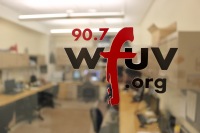By Aislinn Keely

President Trump’s proposed budget plans to eliminate COB, affecting WFUV, an NPR affiliate. (Julia Comerford/The Fordham Ram)
The Trump Administration’s recently proposed federal budget plans to eliminate funding to the Corporation for Public Broadcasting (CPB). If it is signed into effect for the next fiscal year, starting on Oct. 1. Fordham’s radio station, WFUV, stands to lose significant funding as a National Public Radio (NPR) affiliate, since NPR receives federal funding.
CPB makes up about 0.012 percent of the federal budget, coming out to $1.35 per taxpayer. Last year CPB received $445 million in federal funding of the $4 trillion federal budget. CPB provides aid to nearly 1,500 local public television and radio stations throughout the country. Less than two percent of NPR’s budget comes from CPB, however CPB assists local stations in paying their dues as NPR affiliates.
The cuts will impact music stations like WFUV, an NPR music station. “People tend not to think of us as such (an NPR station), but there are music stations within the public radio system too that are also NPR affiliates and carry some of that programming and also work with NPR in a lot of different ways,” said Chuck Singleton, general manager of WFUV.
Singleton said federal funding into CPB is not a lot, but the money goes a long way.
“It’s a small investment but it has a great impact in a number of directions, most visibly within public radio and television on the nation’s journalism,” said Singleton. Singleton referenced NPR News and PBS, which are CPB funded, as important members of the national discourse.
WFUV receives $440,000 each year of direct support from CPB, which amounts to about seven percent of the station’s budget, a fairly typical number for larger stations like FUV, according to Singleton.
Singleton said that the effect is slightly more complex than cutting that seven percent.
“There is about an equivalent amount of support that comes from CPB indirectly that stations would have to replace if that funding was to disappear, so all told that’s about a million dollars,” said Singleton.
This indirect support is related to music licensing, publishing and streaming fees that the station pays for through NPR for a flat rate rather than brokering individual deals at many different rates. Smaller stations face greater repercussions if funding is lost, as federal funding often makes up larger portions of their budgets as opposed to FUV’s.
“There tends to be greater reliance in those communities on this kind of support,” said Singleton.
If the cuts go through, the communities that stations reach, including FUV, may suffer changes in programming. Losing one million in funding, through direct and indirect support, would be a significant lost to FUV’s $6.2 million budget.
“If we had to raise another million dollars, that would be very difficult to pull out of thin air. It would force us to really think about what we’re doing and the effectiveness of it and what we couldn’t afford to do under those circumstances,” said Singleton.
FUV already allocates its resources effectively and is “fairly lean” in its budget and staffing, according to Singleton. Cutting another million from the budget could pose difficulties.
“Let’s just suffice it to say it would seriously compromise the quality of what we do in a number of directions,” said Singleton. This includes the public service that the station provides to the community, artist support and the training of between 120 and 150 Fordham students of which 70 to 85 work paid internships. Even in the event of such cuts, FUV would be unable to turn to advertising as they are a public station and barred from engaging in traditional advertising.
The largest portion of FUV’s budget comes from listener support, which makes up nearly two thirds of the budget. The station received the necessary funds from the recent fundraising.
“We had a very successful Spring Drive, probably our strongest Spring Drive in five years,” said Singleton. Though he said that it can be hard to attribute the success of a fundraiser, which had a very popular theme and incentives, the awareness to the possible cuts had a significant impact.
“People want to make sure that it continues, so that certainly played a part in it,” said Singleton.

Will be very unfortunate if this happens. WFUV is one of few bright spots at Fordham right now.